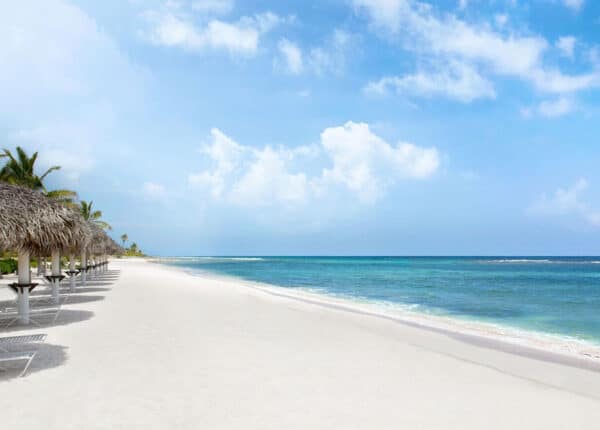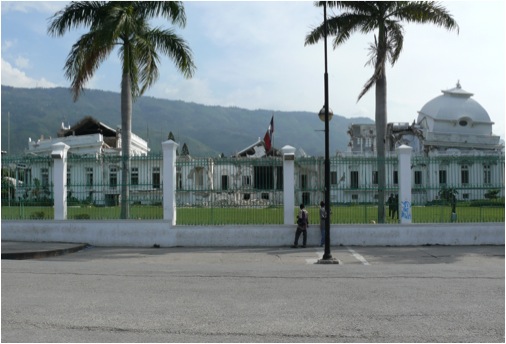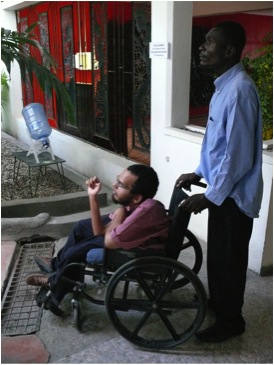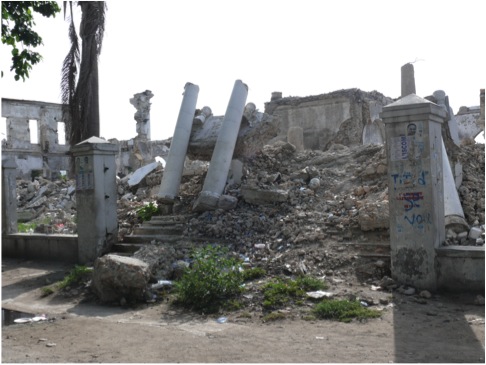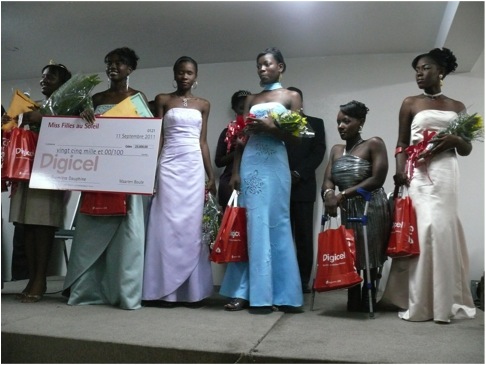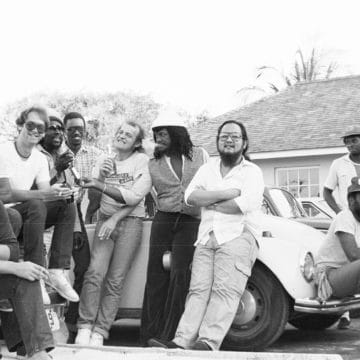By James English
All photos by James English
PORT-AU-PRINCE, Haiti – Sainte Marie is a neighborhood located on the side of a steep hill in southern Port-au-Prince. The area was heavily damaged during the earthquake of January 12, 2010, and since then Mexican billionaire Carlos Slim has taken the lead on rebuilding the local clinic and school. Construction is also underway on a grim addition to the community, an orphanage for abandoned youth and children who lost parents during the quake.
On this hot and humid September day, a green SUV claws its way past Sainte Marie’s various construction sites and continues further up the rutted dirt road to a smaller, but no less significant project. A tall, athletic Haitian man emerges from the driver’s side of the vehicle and removes a wheelchair from the back of the Nissan Four Runner. He then opens the passenger door and gently lifts a young, bearded man with glasses from the seat and carries him into the building, where he places him in the wheelchair.
This is another day at the office for Gerald Oriol, founder of Fondation J’Aime Haiti [“I Love Haiti” Foundation), a nonprofit that champions the rights of the disabled and impoverished in Haiti. J’Aime Haiti and Sporting Chance Foundation are nearing completion on a 10-computer cyber center in Sainte Marie. Oriol explains that approximately 350 different students will visit the center each week, for one-hour tutoring sessions, and in the evenings adult community members will have access to the computers to check email or browse the web.
Oriol’s office was destroyed during the earthquake, and he is using the computer center as a temporary headquarters for J’Aime Haiti. The fact that Oriol is even in the center is impressive. He has muscular dystrophy and has been confined to a wheelchair since childhood. Still, Oriol considers himself lucky. He is one of the few among Haiti’s disabled population whose family had the means to send him to a private school where the principal and teachers were willing to accommodate his disability.
The vast majority of children in Haiti with disabilities do not attend school, perhaps 5 to10 percent compared to roughly 70 percent attendance rate for the general population. Oriol believes most students with disabilities could be integrated into a regular school, if the environment were conducive to that.
“Accessibility is certainly a major barrier, and the physical environment [in Haiti] is difficult for people with limited mobility,” Oriol says. “With reconstruction underway, it is likely that many schools will be rebuilt. One thing the disabled community is lobbying for is an accessible environment. We also need teachers who have the skills to cope with children who have different means of learning and that face different challenges. These initiatives may seem like common sense, but you have to raise awareness.”
Above: Gerald Oriol
Currently, none of Haiti’s private or public universities offers special education courses. The only teachers that do have special education training are those who studied abroad or perhaps participated in a program sponsored by an NGO. Additionally, there are only a few schools in Port-au-Prince exclusively for students with disabilities, certainly not enough to accommodate Haiti’s entire disabled population.
Despite his own disability, Gerald is determined to fight for the nation’s poor and disabled through his non-profit, J’Aime Haiti. Oriol believes disabled citizens are capable of contributing to Haiti’s economic development if they are only given the chance. That is why he designed a program to train disabled persons as cell phone minute salesmen.
J’Aime Haiti provides special phones, training, and a small grant to disabled persons in the western towns of Jeremie and Les Cayes and the southern seaside community of Jacmel. The phones are used to sell and add minutes to users of Voila, the nation’s second largest cell phone company. The participants are also trained in cell phone repair and salesmanship and attend monthly meetings to share their success stories. Additionally, participants receive a small grant of about $200 for the purpose of starting a secondary business, typically selling refreshments along with the cell phone minutes.
The program is producing strong results; only one of the original 58 participants has had funding removed for failure to perform and sales by disabled vendors are now matching those by non-disabled vendors in the same markets.
Disabled Government
Current estimates place Haiti’s disabled population at approximately 800,000. For a nation of nine million, that represents nearly 9 percent of the total population. In 2007, the government of Haiti established the Office for the Secretary of State for the Integration of People with Disabilities, which started a push for regular schools to accept students with disabilities and for the nation to begin accommodating its sizeable disabled population.
The rights of disabled persons in Haiti are technically protected, as the country is a signatory to the UN Convention on the Rights of People with Disabilities and the Organization of American States (OAS) Inter-American Convention on the Elimination of All Forms of Discrimination Against People With Disabilities. There is also proposed legislation, further protecting the rights of the disabled, that has passed the lower chamber of the Haitian parliament and is awaiting a vote in the senate.
Then came last year’s earthquake, which struck at the heart of Haiti and delivered a knockout blow to a country that was still reeling from the devastating effects of four severe hurricanes in 2008 – Fay, Gustav, Hanna and Ike.
While the exact death toll from the earthquake may never be known, the Haitian government estimates more than 200,000 died in the catastrophe, while tens of thousands were injured, some permanently disabled, and more than a million left homeless.
Sadly, many of those who might have assisted the injured and disabled were lost that day when the Nursing School collapsed, as well as the Ministry of Health, the UN Headquarters, St. Vincent’s School for Disabled Children and even the presidential palace. In all, an estimated twenty-five percent of Haiti’s civil servants perished in the disaster.
At a time when Haiti desperately needs action, the government is further paralyzed by President Martelly’s inability to gain Parliamentary approval of his nominee for Prime Minister. Two previous candidates, Daniel-Gerard Rouzier and Bernard Gousse have been rejected. A third, Garry Conille, who served as an aide to former US President Bill Clinton in his position as UN Special Envoy to Haiti, has been approved by Haiti’s Parliament, but still awaits Senate approval, which could come this week.
Once the Prime Minister’s post is filled, the balance of the government’s ministers can be appointed. Until that time, the majority of all government projects have been put on hold, further increasing tensions in the capital city.
Despite the many challenges facing his country, Oriol remains optimistic.
“The earthquake created some opportunities for the disabled,” he says. “Some who were missing limbs before the earthquake were able to obtain prosthetics and services from the numerous NGO’s who came to assist.”
Then there is the rebuilding, which offers some hope for the disabled that a new, more accessible Port-au-Prince will emerge.
“When I think of disability in Haiti,” Oriol says, “I think of development in general. If we create an environment where people with disabilities can gain their autonomy, it will be good for the country as a whole. The vast majority of people with disabilities in Haiti are dependent on their family and the good will of friends to survive and meet their needs. If they are able to contribute toward their personal development, it will be good for them, good for their families and good for the country.”
On Sunday evening, September 11th, Gerald attends the finals of the Miss Filles au Soleil [“Daughters of the Sun”] beauty pageant in Port-au-Prince. The event is held at Le Plaza Hotel, which was once a Holiday Inn.
The trip to the hotel illustrates the challenges disabled persons in Haiti face every day. To begin with, there is no handicapped parking, so Emmanuel, the driver, must unload Gerald in a busy hotel lot.
Once Oriol is safely in the wheelchair, he must navigate narrow doorways and walkways without ramps. Amazingly, the hotel has scheduled the event in a room on the second floor and the building has no elevators. Like mountain climbers at the base of a peak, Gerald and Emmanuel survey the winding staircase before them, which may appear elegant to most guests, but represents a nearly insurmountable obstacle to a person in a wheelchair.
Refusing to succumb to the barriers, Oriol recruits several young men, including one who is blind, to carry him up the spiral staircase. Another young lady in a wheelchair waits patiently at the bottom for her turn.
Upstairs, seven disabled young ladies are competing for the title of the 2011 Miss Filles au Soleil. Three are deaf, one is blind, one has no feet, one has a damaged leg and another nearly lost a foot in the earthquake.
A beauty pageant for disabled persons may seem like an unusual event for a country coping with natural disasters, poor sanitation, damaged infrastructure, malnutrition and erosion from deforestation, but to Gerald, it makes perfect sense. The pageant is about making the disabled visible in society, while building self-esteem and promoting awareness.
The room is packed with more than 200 people, including some media, as the contestants perform in a round of talent followed by a second round involving formal dress and the answering of a question – “As Miss Filles au Soleil, what advice would you give to a young woman who lost both of her arms in an accident?”
After three hours of intense competition, Jessica Pierre, the young lady whose foot was badly damaged in the earthquake, is crowned the winner. She receives a check for 30,000 gourdes [$743] from the Office for the Secretary of State for the Integration of People with Disabilities and a new phone from Digicel, Haiti’s largest wireless company, which rebuilt the historic Iron Market following the quake and is serving as one of the primary sponsors of the pageant.
Following a perilous trip down the spiral staircase in the dark, Emmanuel carefully returns Gerald to the passenger seat of the Four Runner. Once Oriol is propped up with pillows and buckled in, Emmanuel loads the wheelchair into the back of the vehicle.
We sit together in silence until Gerald turns his head to me.
“What this event shows you is that if these people can make it, then Haiti can make it.”
James English is an International Advisor at Texas Christian University in Fort Worth, Texas. He recently traveled to Haiti to develop a program for TCU on the Haitian Diaspora.
You can learn more about Fondation J’Aime Haiti through their Facebook page at http://www.facebook.com/jaimehaiti or through their website at http://www.jaimehaiti.org/.
